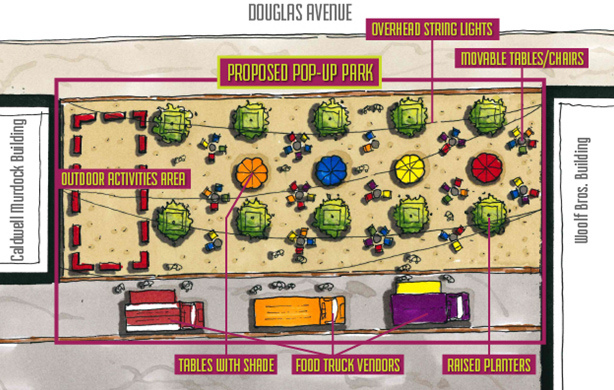
Multiple dump trucks running eight hours a day for 10 days, and more than $50,000 in dirt. That’s what it will take to fill a massive hole in Wichita, Kansas' downtown business district. Once the dirt is in, it will become a temporary park with concrete ping pong tables, food trucks, and local art installations. Then, it will all come down, and a building will go up.
But this park isn’t being paid for through the city’s park budget. Instead, it’s the developers of the building that will eventually rise from its ashes that are forking out the cash. Why would a private developer pour $50,000 into dirt for a space they’re not even occupying? Developer Michael Ramsey says investing in activating the entire area will benefit him as he owns nearby buildings and wants to attract new tenants—both residential and commercial.
“It’s really about building on a future synergy where all of a sudden it becomes a very cool place to be, a very inviting environment and then more people will come. ... To me, people and jobs are synonymous,” says Ramsey, adding that the more people who want to live in the area, the better it becomes for developers, businesses and residents.
It’s a powerful illustration of the power of public space, and neither the city nor developer could accomplish such an undertaking alone.

Image from www.weigand.com.
Dubbed “the Hole” by locals, the 5000-cubic-yard void was once the site of two historical buildings. Both were knocked down in favour of a proposed multi-use, village-style development that would have been the first of its kind in Wichita.
Unfortunately, construction was halted shortly after the financial crisis in 2008, after the hole had been dug. The land is private and the city has very little jurisdiction over its future. The sheer cost of filling the hole, around $100,000 after prep work and dirt hauling, was enormous. The developers don’t have access to all of the resources and networks the city has used, such as design students at Kansas State University, grants from the Knight Foundation, and the planning skills of the Wichita Downtown Development Corporation. A developer willing to invest in the health of a city and a planning corporation willing to collaborate with the private sector are going to directly benefit the public realm and businesses surrounding it.
All of this might seem like a lot of work for a temporary park, but Jason Gregory, vice-president of the Wichita Downtown Development Corporation, says he imagines it will exist for about five years. And for all of the financial and logistical challenges the project faced, Gregory’s team never lost sight of the intended outcome of the park.
“We knew if we just created a park, that was going to do nothing. We have plenty of pocket parks that nobody uses. So we had two goals: number one, we wanted to fill it in and make it aesthetically attractive. Number two, we knew we had to have something that would activate the space on a daily basis,” says Gregory.
To achieve the latter, the park will include food carts that will rotate throughout the summer season and hopefully attract downtown employees who, Gregory says, currently drive to more desirable areas for their lunches.
In line with the park’s temporary nature, furnishings and other assets like planters, trees, and art will be modular. Patrons will be able to move furniture as needed, adding to the flexibility of the space. These assets are planned to be used in future parks once the pop-up park downtown gives way to development. 
This article was reprinted in its entirety from discoursemedia.org. Read the original article here.

